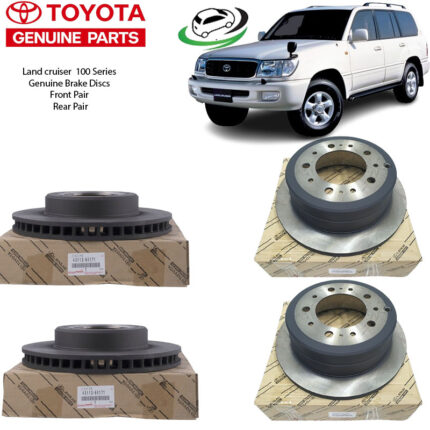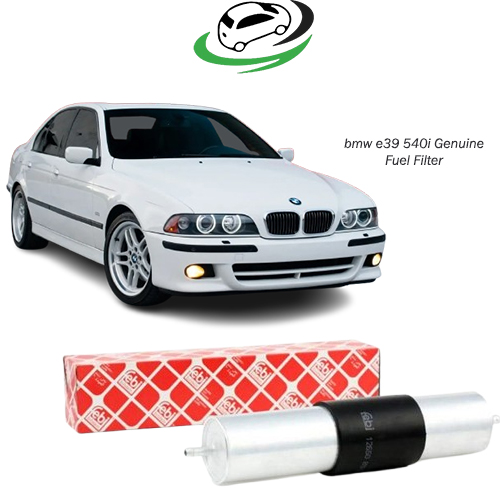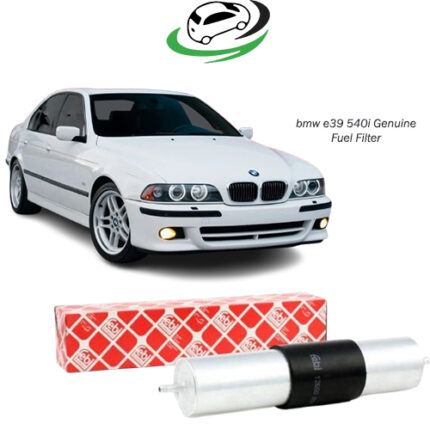Get BMW E39 540i Genuine Fuel Filter 13321702632
A genuine fuel filter is a critical component in the fuel delivery system of any vehicle, ensuring the engine receives clean and contaminant-free fuel. While it may seem like a small and insignificant part, the fuel filter plays a significant role in preserving engine health, optimizing fuel efficiency, and maintaining overall vehicle performance. In this comprehensive guide, we’ll delve into what a genuine fuel filter is, how it functions, its benefits, signs of wear, maintenance tips, and why using a genuine part is crucial for long-term reliability and performance.
What is a Genuine Fuel Filter?
A genuine fuel filter is a filter manufactured to the exact specifications of a particular vehicle brand by an Original Equipment Manufacturer (OEM). These filters are designed to meet the specific requirements set by the vehicle manufacturer, ensuring perfect fit, function, and durability. Unlike aftermarket filters, which may vary in quality and design, a genuine fuel filter is engineered to work seamlessly with your vehicle’s fuel system, protecting it from dirt, debris, rust, and other contaminants that can degrade performance over time.
Fuel filters come in different shapes and sizes depending on the make and model of the vehicle, but they all serve the same essential purpose — to filter out impurities from the fuel before it enters the engine’s fuel injectors or carburetor.
The Role and Function of a Fuel Filter
The fuel filter is located between the fuel tank and the engine, and its primary role is to ensure that the fuel entering the engine is clean. Here’s how it works:
1. Filtering Contaminants: Fuel contains various impurities, such as dirt, rust particles, and debris, which can accumulate in the fuel tank over time. The fuel filter captures these particles, preventing them from entering the fuel injectors or carburetor, which could otherwise cause clogging or damage.
2. Ensuring Proper Fuel Flow: In addition to filtering out contaminants, the fuel filter ensures a steady and unrestricted flow of fuel to the engine. If the filter becomes clogged or dirty, it can restrict fuel flow, leading to poor engine performance, reduced power, or even stalling.
3. Protecting Engine Components: The fuel injectors, fuel pump, and engine valves are sensitive to impurities in the fuel. By filtering out harmful particles, the fuel filter helps protect these components from wear, corrosion, and potential damage.
4. Supporting Fuel Efficiency: A clean and properly functioning fuel filter ensures that the engine receives the right amount of fuel at the right pressure, which contributes to optimal fuel combustion. This, in turn, helps maintain fuel efficiency and reduces emissions.
Types of Fuel Filters
Fuel filters are designed based on the type of fuel delivery system in the vehicle. The two most common types are:
- In-Line Fuel Filters: These filters are located along the fuel line, typically between the fuel tank and the fuel injectors. They are cylindrical in shape and are often easy to access for replacement.
- In-Tank Fuel Filters: Some vehicles have fuel filters that are integrated into the fuel pump assembly inside the fuel tank. These filters are more challenging to access and usually require dropping the fuel tank to replace them.
There are also diesel fuel filters, which are designed to handle the unique properties of diesel fuel. Diesel fuel is more prone to contamination by water, so diesel filters often have a water separation function to prevent water from entering the engine.
Benefits of Using a Genuine Fuel Filter
Choosing a genuine fuel filter over aftermarket options provides several advantages that can significantly impact the performance and longevity of your vehicle. These benefits include:
1. Perfect Fit and Compatibility
Genuine fuel filters are designed specifically for your vehicle’s make and model, ensuring they fit perfectly into the fuel system. Unlike generic aftermarket filters, which may have slight variations in size or design, a genuine filter guarantees a seamless installation and optimal function.
2. Superior Filtration Performance
OEM fuel filters are manufactured to the highest standards and use high-quality materials that offer superior filtration. They are designed to capture the smallest particles and contaminants, ensuring your engine receives the cleanest fuel possible. Aftermarket filters may not provide the same level of filtration, which can lead to engine wear and reduced performance over time.
3. Enhanced Durability and Longevity
A genuine fuel filter is built to last. OEM filters undergo rigorous testing to ensure they can withstand the demands of the fuel system and provide long-lasting performance. Aftermarket filters, on the other hand, may not be as durable and may require more frequent replacements, increasing long-term maintenance costs.
4. Protects Engine Components
By ensuring clean fuel reaches the engine, a genuine fuel filter helps protect critical components like fuel injectors, the fuel pump, and engine valves from damage caused by contaminants. This leads to fewer repairs and replacements of expensive parts over the vehicle’s lifespan.
5. Maintains Manufacturer Warranty
In many cases, using non-genuine parts can void the vehicle’s manufacturer warranty. By sticking with a genuine fuel filter, you ensure that your vehicle remains covered under warranty, protecting you from potential repair costs.
Signs Your Fuel Filter Needs Replacement
Over time, fuel filters can become clogged with dirt and debris, reducing their effectiveness. It’s essential to recognize the signs that your fuel filter may need replacement to prevent more significant issues from developing. Common signs of a failing or clogged fuel filter include:
1. Poor Engine Performance
If your engine is struggling to get enough fuel, it may exhibit poor performance, especially under acceleration. You may notice a lack of power or hesitation when trying to speed up.
2. Difficulty Starting the Vehicle
A clogged fuel filter can restrict the flow of fuel to the engine, making it harder to start the vehicle. If you experience difficulty starting, especially after the vehicle has been sitting for a while, the fuel filter may be to blame.
3. Frequent Engine Stalling
If the fuel filter is clogged, it can cause the engine to stall, particularly when the vehicle is under load or when driving at higher speeds. Stalling is a clear sign that the engine isn’t receiving enough fuel.
4. Check Engine Light
In some cases, a clogged fuel filter can trigger the vehicle’s Check Engine Light. While this light can illuminate for various reasons, if it coincides with other symptoms like poor performance or stalling, it’s worth checking the fuel filter.
5. Strong Odor of Fuel
A clogged fuel filter can cause fuel to back up in the system, leading to a strong smell of fuel near the engine or exhaust. This can also indicate a leak or issue with the fuel line, so it’s important to address this symptom immediately.
6. Increased Fuel Consumption
If your engine isn’t receiving the correct fuel pressure due to a clogged filter, it may burn more fuel to compensate for the lack of power. This can result in reduced fuel efficiency and higher fuel costs.
When and How to Replace a Fuel Filter
Replacing a fuel filter is a regular part of vehicle maintenance, and the timing depends on the type of vehicle and driving conditions. Most manufacturers recommend replacing the fuel filter every 20,000 to 30,000 miles, but this can vary.
Here’s a general overview of the replacement process:
1. Locate the Fuel Filter: Depending on your vehicle, the fuel filter may be located along the fuel line or inside the fuel tank. Consult your owner’s manual for the exact location.
2. Relieve Fuel Pressure: Before replacing the filter, it’s essential to relieve the pressure in the fuel system to prevent fuel from spraying when you disconnect the lines.
3. Disconnect the Fuel Lines: Use a wrench to loosen the fuel lines attached to the filter. Be sure to catch any fuel that may spill out.
4. Remove the Old Filter: Once the fuel lines are disconnected, you can remove the old filter from its bracket.
5. Install the New Filter: Install the new genuine fuel filter, ensuring that it’s oriented correctly. Reconnect the fuel lines and secure the filter in place.
6. Test the Vehicle: After the new filter is installed, start the vehicle and check for any leaks or performance issues.
Why Choose Genuine Over Aftermarket Filters?
While aftermarket filters are often cheaper, they come with several risks, including poor fitment, subpar filtration, and reduced durability. Genuine fuel filters are designed specifically for your vehicle and offer the best protection for your engine. They are rigorously tested and backed by the manufacturer’s warranty, giving you peace of mind that your vehicle will run smoothly and efficiently.
Conclusion
A genuine fuel filter is an essential part of your vehicle’s fuel system, ensuring that the engine receives clean fuel and operates efficiently. By using a genuine fuel filter, you can protect your engine from contaminants, improve fuel efficiency, and extend the lifespan of critical engine components. Regular maintenance and timely replacement of the fuel filter will help you avoid costly repairs and keep your vehicle running at its best. Whether you’re driving a Toyota, BMW, or any other make, investing in a genuine fuel filter is a smart choice for long-term reliability and performance.
Follow us on Facebook for more parts.





Reviews
Clear filtersThere are no reviews yet.